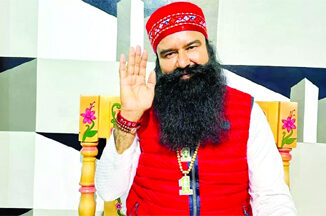
Days after Prime Minister Modi warned the judiciary of dangers posed by five-star activists, the Union Home Ministry cut off foreign funding to Greenpeace for “campaigning against government policies” and “obstructing India‘s energy plans”. Among the reasons cited for the ban is Greenpeace activists “holding talks” with the Aam Aadmi Party. Foreign money is welcome for pollution-causing industries but not for raising a voice to protect the forests, the environment or human rights. Swift green clearances for projects are seen as an achievement by the minister who is tasked with safeguarding the country’s environment and natural resources.
Take Maharashtra. Union Minister of State for Agriculture Mohanbhai Kundaria told the Rajya Sabha recently that 135 farmers killed themselves in the first 58 days of this year in the state’s Aurangabad division. That is not what worries the BJP government. It is devoting its time and resources to enforcing a ban on beef and promoting Marathi films. Most Indians do not approve of cow slaughter and will like the government to provide for adequate cow sheds. Cows become a financial liability once they stop yielding milk. What should farmers, barely making two ends meet, do? And those who survive on beef business? The state high court rightly asked the government how it could extend the ban to other states by stopping people from eating beef produced there. The Devendra Fadnavis government not only wants to decide what people should eat but also what films they should watch. Multiplexes have been forced to show Marathi films at prime time. When writer Shobhaa De protested against such “dadagiri”, cultural extremists ganged up to gag her.
As if the censor board was not giving enough trouble to filmmakers, the SGPC has started demanding bans on films it disapproves of. Fanatics want to decide what people should wear, watch, read and even which religion they should follow, threatening in the process the very foundations of a secular, liberal India. Intolerance is growing in Modi raj and targets are clear. Anyone who opposes what the government is doing or the religious/cultural agenda it is patronising puts himself at risk.





It is evident that the Sangh Parivar is to Hinduism, what the Popular Front of India [PFI] is to Islam. Both are driven by the desire to instill their cultural ideas by force. How can Sangh Parivar oppose the establishment of Shariah law, when the Sangh itself advocates similar draconian measures of its own. Independent voters will oppose both the Sangh and the PFI. Unfortunately, political parties like the Congress, Communists, Janata Dal, and various regional parties, are still pandering to religious fascists of all stripes. This has created a situation in many states where it’s difficult to differentiate between secular and non-secular parties. This anomaly, together with the public desire for a corruption-free government was exploited to the hilt by the BJP in its rise to power in the Centre. Modi’s Gujarat experiment cannot be considered a model for the rest of the country as the social and developmental equations in the rest of the country especially in the south and the east, are completely different. Modi’s rise to power was marked by extreme media hype of the impending arrival of national prosperity. Mesmerized and hypnotized by Modi, the country’s youth overwhelmingly voted for Modi. But the same youth who have a very small time horizon, will be the first to denounce Modi if their expectations are not met. Effecting long-lasting change at the Centre is a totally different ball-game as compared to that of a state, and usually takes years if not decades. The Sangh Parivar is well aware of these facts, and will not hesitate to push its social re-engineering agenda at the earliest, lest the NDA lose the next Lok Sabha elections due to failed expectations as well as the possible re-emergence of an alliance between Congress, Janata Dal, Communists, and some regional parties.